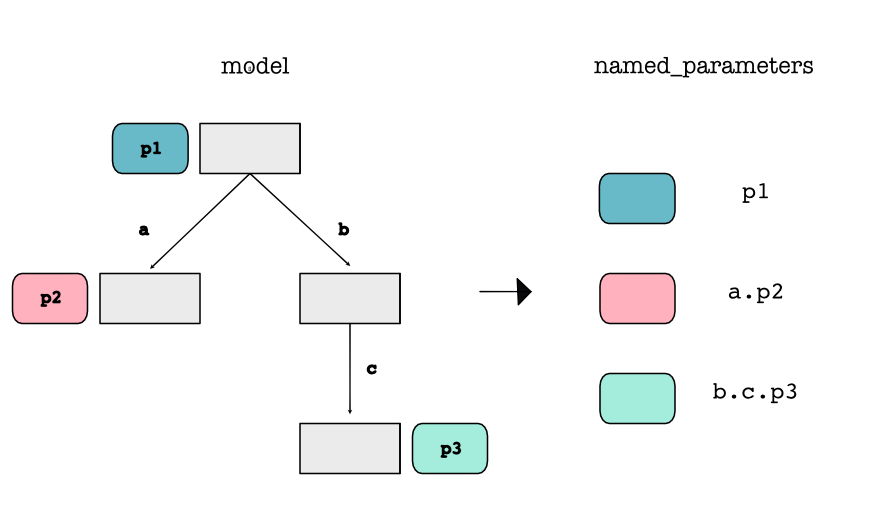Modules¶
Researchers often disagree on exactly what the term deep learning means, but one aspect that everyone agrees on is that deep models are big and complex. Common models can include hundreds of millions of learned parameters that span over hundreds of informal module groups. In order to work with such complex systems, it is important to have data structures which abstract away the complexity so that it is eaiser to access and manipulate specific components, and group together shared regions.
On the programming side, Modules have become a popular paradigm to group parameters together to make them easy to manage, access, and address. There is nothing specific to machine learning about this setup (and everything in MiniTorch could be done without modules), but they make life easier and code more organized.
First, let's define a Parameter. For now, we will just think of Parameter as a holder. It is just a special object that stores a value.
-
class
minitorch.Parameter(x=None)¶ A Parameter is a special container stored in a
Module.It is designed to hold a
Variable, but we allow it to hold any value for testing.
Parameters become more interesting when they are grouped with Modules. Modules provide a way of storing and finding these parameters. Let's look at the Module class to see how this works.
Modules are a recursive tree-shaped data structure. Each module can store three things: 1) parameters, 2) non-parameter data, 3) other modules. Internally, the user stores each of these directly on self, but the module spies under the hood to determine the type of each assignment.
Here is an example of the simplest usage of a module
from minitorch import *
class OtherModule(Module):
pass
class MyModule(Module):
def __init__(self, arg):
# Initialize the super-class (so it can spy)
super().__init__()
# A parameter member (subclass of Parameter)
self.parameter1 = Parameter(15)
# A non-parameter member
self.data = 25
# A module member (subclass of Module)
self.sub_module = OtherModule(arg, arg+10)
Warning
All subclasses must begin their initialization by calling
super().__init__()
This allows the module to capture any members of type Module
or Parameter
and store them in a special dictionary.
Internally, parameters (type 1) are stored in _parameters, data
(type 2)
is stored on self, modules (type 3) are stored in _modules.
The main benefit of this infrastructure is that it allows us to
flatten a module to get out all of its parameters using
named_parameters(). This returns a dictionary of all of the
parameters in the module and in all descendent sub-modules. The names
here refer to the keys in the dictionary which give the path to each
parameter in the tree (similar to python dot notation). Critically
this function does not just return the current module's parameters, but
recursively
collects parameters from all the modules below as well.
Here is an example of how you can create a tree of modules and then extract the flattened parameters
class Module1(Module):
def __init__(self):
super().__init__()
self.p1 = Parameter(5)
self.a = Module2()
self.b = Module3()
class Module2(Module):
def __init__(self):
super().__init__()
self.p2 = Parameter(10)
class Module3(Module):
def __init__(self):
super().__init__()
self.c = Module4()
class Module4(Module):
def __init__(self):
super().__init__()
self.p3 = Parameter(15)
np = Module1().named_parameters()
assert np["b.c.p3"].value == 15

Additionally, a module can have a mode indicating how it is
currently operated. The mode should propagate to all of its
child modules. For simplicity, we only consider the train and eval mode.